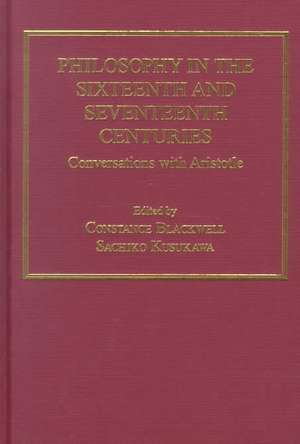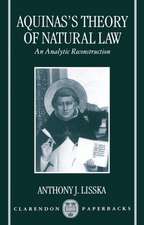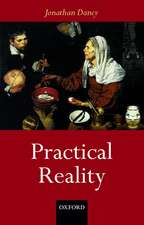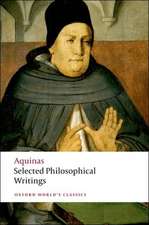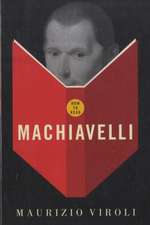Philosophy in the Sixteenth and Seventeenth Centuries: Conversations with Aristotle
Autor Constance Blackwell, Sachiko Kusukawaen Limba Engleză Hardback – 28 dec 1999
Preț: 1000.27 lei
Preț vechi: 1219.84 lei
-18% Nou
Puncte Express: 1500
Preț estimativ în valută:
191.40€ • 200.25$ • 158.100£
191.40€ • 200.25$ • 158.100£
Carte tipărită la comandă
Livrare economică 03-17 aprilie
Preluare comenzi: 021 569.72.76
Specificații
ISBN-13: 9780860786689
ISBN-10: 0860786684
Pagini: 438
Dimensiuni: 156 x 234 x 24 mm
Greutate: 0.45 kg
Ediția:1
Editura: Taylor & Francis
Colecția Routledge
Locul publicării:Oxford, United Kingdom
ISBN-10: 0860786684
Pagini: 438
Dimensiuni: 156 x 234 x 24 mm
Greutate: 0.45 kg
Ediția:1
Editura: Taylor & Francis
Colecția Routledge
Locul publicării:Oxford, United Kingdom
Cuprins
Contents: Introduction; Introducing Aristotle to the sixteenth century: the Lefèvre enterprise, Eckhard Kessler; Learning the syllogisms: Byzantine visual aids in Renaissance Italy - Ermolao Barbaro (1454-93) and others, Letizia Panizza; Philology and philosophy in the margins of early printed editions of the ancient Greek commentators on Aristotle, with special reference to copies held in the Biblioteca Nazionale Braidense, Milan, Silvia Fazzo; The cultural programmes of Alessandro Piccolomini and Sperone Speroni at the Paduan Accademia degli Infiammati in the 1540s, Heikki Mikkeli; Antistrophic rhetoric: Aristotelian rhetoric in Renaissance Rome and Padua, Jean Dietz Moss; Aristotle commentary and ethical behaviour: Bernardo Segni on friendship between unequals (Ethica d’Aristotile tradotta in lingua fiorentina et commentata 1550), Ullrich Langer; La Politique d’Aristote en français par Louis le Roy (1568), Pierre Lardet; Individual and community in the ’second scholastic’: subjective rights in Domingo de Soto and Francisco Suárez, Annabel Brett; Lutheran uses of Aristotle: a comparison between Jacob Schegk and Philip Melanchthon, Sachiko Kusukawa; The teaching of Aristotle in late sixteenth century Tübingen, Charlotte Methuen; Kepler as reader and translator of Aristotle, Nicholas Jardine and Alain Segonds; Aristotelianism more geometrico: Honoré Fabri, Paul Richard Blum; The development of Jesuit ’physics’ in Italy, 1550-1700: a structural approach, Ugo Baldini; Metaphysics and natural philosophy as sciences: the Catholic and Protestant views in the sixteenth and seventeenth centuries. Charles H. Lohr; Language in the mind: reflexive thinking in the late Renaissance, Ian Maclean; Lionardo Di Capoa’s Parere (1681): a legal opinion on the use of Aristotle in medicine, Nancy Struever; Aristotle and the Cambridge Platonists: the case of Cudworth, Sarah Hutton; Descartes and the late Scholastics on the order of the sciences, Roger Ariew; Hobbes
Recenzii
'... anyone interested in early modern intellectual history will find something worth reading here.' Neo-Latin News
Notă biografică
Constance Blackwell, Sachiko Kusukawa
Descriere
This volume offers an important re-evaluation of early modern philosophy. It takes issue with the received notion of a ’revolution’ in philosophical thought in the 17th-century, making the case for treating the 16th and 17th centuries together. Taking up Charles Schmitt’s formulation of the many ’Aristotelianisms’ of the period, the papers bring out the variety and richness of the approaches to Aristotle, rather than treating his as a homogeneous system of thought. Based on much new research, they provide case studies of how philosophers used, developed, and reacted to the framework of Aristotelian logic, categories and distinctions, and demonstrate that Aristotelianism possessed both the flexibility and the dynamism to exert a continuing impact - even among such noted ’anti-Aristotelians’ as Descartes and Hobbes. This constant engagement can indeed be termed ’conversations with Aristotle’.
